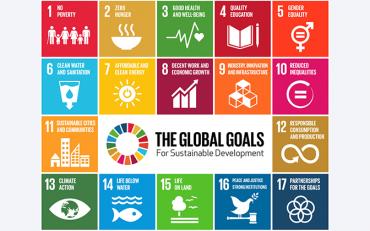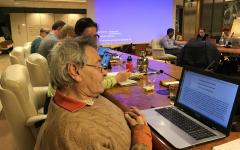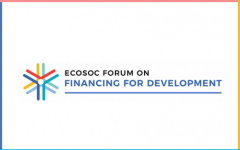In this update:
1. Financing for Development (FfD) Preparatory Process
2. FfD Forum outcome and negotiation process
3. The Inter-agency Task Force
4. Engagement in the CSOs for Financing for Development (FfD) Group
5. High-Level SDG Financing Lab
6. Position paper on the FfD Forum developed by the Stakeholder Group of Persons with Disabilities
1. Financing for Development Forum Preparatory process
Formal registration for the Forum has not yet opened (we will send this information when it opens). The draft programme of the FfD Forum is available.
2. FfD Forum outcome and negotiation process
In accordance with paragraph 132 of the Addis Agenda, the annual FfD Forum results in intergovernmentally agreed conclusions and recommendations that are fed into the overall follow-up and review of the implementation of the 2030 Agenda for Sustainable Development in the High-level Political Forum (HLPF) on Sustainable Development.
H.E. Mr. Marc Pecsteen de Buytswerve, Permanent Representative of Belgium to the UN, and H.E. Mr. Jerry Matthews Matjila, Permanent Representative of the Republic of South Africa to the UN, were appointed, on 28 March 2017, by the President of ECOSOC to act as co-facilitators for the conclusions and recommendations of the 2017 FfD Forum.
Initial negotiations have started. The second informal will take place on 21 April with the objective of compiling a zero draft during the week of 24 April when substantive negotiations will begin. The outcome document of Forum is expected to be adopted at the end of the second day (end of the ministerial segment) of the FfD Forum (23 May).
It is important to note that in the FfD process there is a certain amount of tension, particularly between Member States from the global South and North. Not exclusively on substantive issues, such as where financing is emerging, but also in terms of the relevance of the process (i.e., that the FfD process is a satellite being absorbed by larger 2030 Agenda processes).
3. The Inter-agency Task Force
The Inter-Agency Task Force on Financing for Development was convened by the Secretary-General to follow up on the Addis Ababa Action Agenda and is comprised of over 50 United Nations agencies, programmes and offices, regional economic commissions and other relevant international institutions.
- Report annually on progress in implementing the Addis Agenda and other Financing for Development outcomes and the means of implementation of the 2030 Sustainable Development Agenda, and
- Advise the intergovernmental follow-up process on progress, implementation gaps and recommendations for corrective action, while taking into consideration the national and regional dimensions.
- A discussion of the global context and its implications,
- An overview of each chapter of the Addis Agenda, while covering the broader set of commitments in an on-line annex, and
- Analyses of thematic issues.
References:
- One reference in the Executive Summary (page 1) under the paragraph Increased long-term investments need to be complemented by measures to directly ameliorate the living conditions of the poor and vulnerable, such as social protection floors.
- Two references in the section on Addressing vulnerabilities (page 28 and 29)
- Five references, including the Washington Group on Disability Statistics, in the section on Strengthening data and statistical capacities (page 134
- One reference in Data gaps and challenges (Box 1, page 138) specifically on Science, technology, innovation and capacity building - Data on ICT skills and accessible technology for people with disabilities (disaggregated by gender)
We contributed to this draft as the International Disability Alliance (IDA) and the International Disability and Development Consortium (IDDC) on behalf of the Stakeholder Group of Persons with Disabilities. Read the submission.
4. Engagement in the CSOs for Financing for Development (FfD) Group
IDA and IDDC on behalf of the Stakeholder Groups of Persons with Disabilities are members of and collaborate with the CSOs for Financing for Development (FfD) Group (CSO FfD Group).
At the Forum, the CSO FfD Group will be organizing pre- and post-Forum meetings: a full day on Sunday, 21 April and a half day on Friday, 25 May. To participate in these meetings, please register.
We also contributed to the IATF 2017 unedited draft report as part of the CSO FfD Group. Read this submission.
The CSO FfD group is drafting a letter to the ECOSOC President over FfD follow-up, Forum modalities and the agenda. The letter builds upon the following three messages:
- Usual transparency, including being able to participate in negotiations and being able to contribute and participate in the Forum
- Capacity to intervene and present in the programme of the Forum
- Call for multi-year planning and to use the fifth day in the fall to explore and discuss with Member States on multi-year planning
On 18 April, the President of the General Assembly convened the High-Level SDG Financing Lab at the UN in New York. The impetus for this event was for Member States to have a dialogue one month prior to the FfD Forum. The event highlighted the critical importance of sustainable finance for the achievement of the Sustainable Development Goals, including climate action. It focused on how to drive the transformation to align financial markets with sustainable development and discussed ways in which Member States can approach the financing of different SDGs.
Main summary points:
- The private sector was a core theme of the event as a key partner to achieve the SDGs, such as the role of public-private partnerships and banking systems. It was noted that there must be new and different ways to work with the private sector.
- Public-private partnerships will vary depending on context (e.g., post-conflict versus developed countries), but the ambition needs to be clear to address those most left behind.
- The role of technology and access to Internet were emphasized.
- There was discussion on how to reform existing policy and regulatory frameworks to leverage public and private financing for the SDGs, and to contribute to sustainable development, including through local and regional capital markets.
- Marginalized groups were not strongly included in the discussions, but leave no one behind and social inclusion were highlighted in the event.
6. Position paper on the FfD Forum developed by the Stakeholder Group of Persons with Disabilities
The Stakeholder Group of Persons with Disabilities FfD Task Group developed a position paper for the FfD Forum. Read this position paper. This paper will be used for advocacy purposes and shared prior and during the Forum.
For any questions on the above information, please contact Orsolya Bartha (obartha [at] ida-secretariat.org and Elizabeth Lockwood (elizabeth.lockwood [at] cbm.org).



